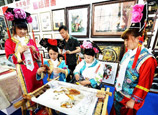
 |
| A black lacquer and gilt mounted serpentine commode in the Louis XV style (19th century). Photo provided to China Daily |
Speaking before the Xiamen auction, Huachen's chairman and president Gan Xuejun says this situation has to change - and soon.
"I assume that in 10 to 20 years we will have a total free market, meaning that China's cultural relics can be sold overseas. And I do hope this can happen even sooner."
Gan says there were sound reasons at the time for preventing the sale of cultural relics, since they were being looted or sold abroad. But the situation has changed, and many items have either been bought back or even returned.
"The policy of putting restrictions on the export of cultural relics and at the same time allowing for their free import is outdated in the context of the internationalization of the auction market."
Now, Gan argues: "Chinese culture needs to be promoted, and artworks such as relics and antiques are the best medium for this."
While it was a red-letter day for the antiquities trade as a whole at the Xiamen free port sale, it wasn't one for the Penny Black, the world's first adhesive stamp.
None were sold, while coins and artworks, ranging from Andy Warhol pieces to classic canvases, also failed to raise much interest.
However, English silver, clocks and bronze figures found buyers. The most expensive lot was a pair of Louis XVI-style gilt bronze center tables by Francois Linke, which sold for 2 million yuan ($325,390).
Though there was some disappointment at a final tally of 23 percent of lots sold for a total of 9.74 million yuan, Triple-A Chairman Chris Ewbank is bullish, calling it a "sale to test the market and gauge the appetite Chinese collectors have for Western antiques and works of art. We have proved it is possible to achieve such a sale. Now we know what is wanted and what is not."


















 People cool off in water from orange-coded alert of heat in Chongqing
People cool off in water from orange-coded alert of heat in Chongqing


![]()
